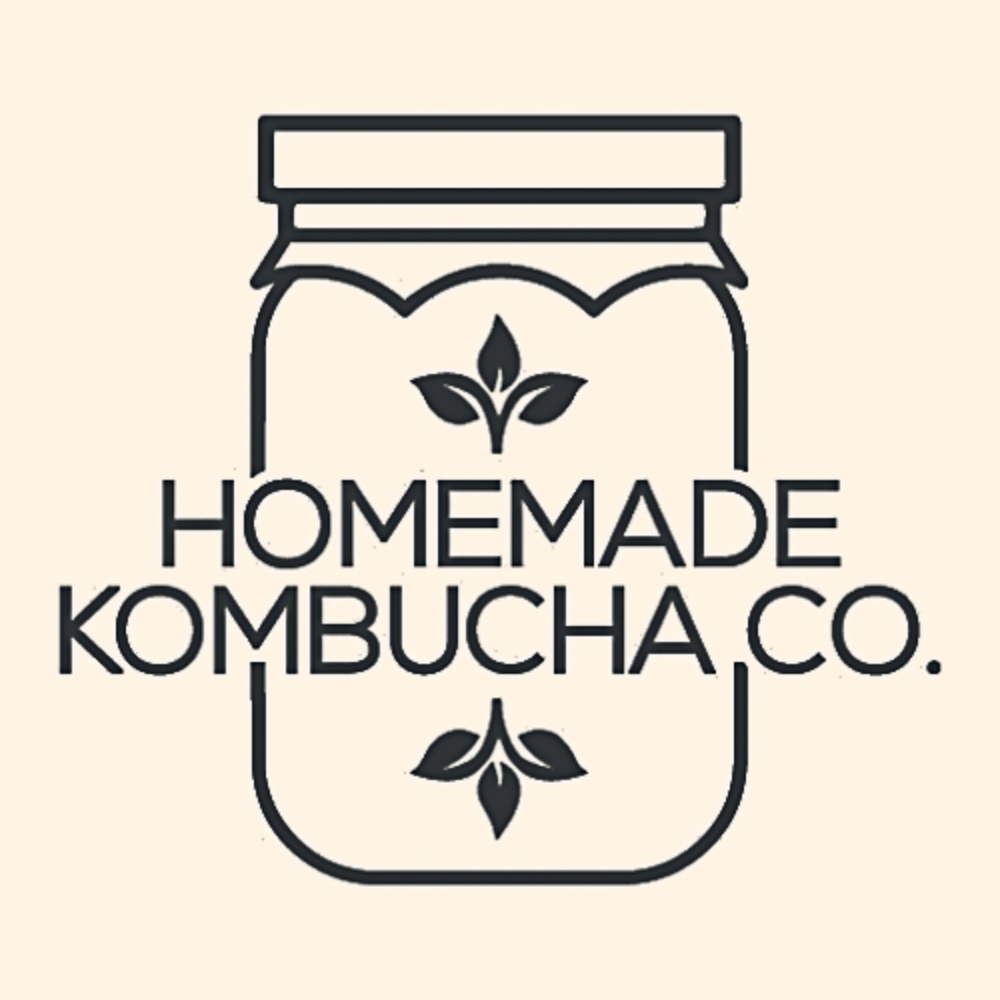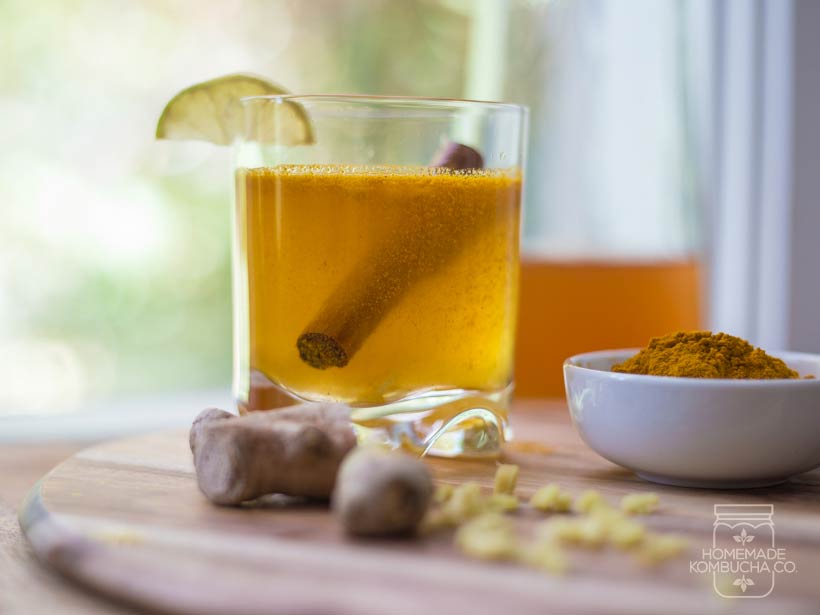This is our kombucha version of a classic health elixir – relying on a combination of spices like turmeric and cinnamon with a vitamin C boost of lemon and ginger.
A turmeric and ginger tea is a popular tonic for dealing with nasty colds and inflammation. By using a green tea kombucha base you can have a drink jam packed full of antioxidants to ward off any sickness, along with the anti inflammatory benefits of curcumin, and gut calming effects of probiotics and ginger.
What does it taste like?
Quite spicy in a gingery sort of way. The subtler flavour of the green tea Kombucha allows the spices to dominate the flavour. If you enjoy turmeric lattes then you will love this.

Ingredients:
- 200mL of Organic Green Tea Kombucha
- 1 teaspoon of organic turmeric
- ⅓ teaspoon of organic cinnamon
- 1 knob of fresh, organic ginger
- Juice from half a fresh, small lemon
Method:
- Pre-brew your Organic Green Tea Kombucha (don’t have a SCOBY – get one here).
- This recipe tastes best when your Kombucha is not too cold, a few degrees cooler than room temperature is ideal. If you have been storing your finished Kombucha in the fridge, leave it out to warm up a little. Before pouring the Kombucha make sure you strain out mini SCOBYs that have formed using a metal free strainer like this.
- Pour your Kombucha into a glass.
- Peel and then finely grate your ginger, add it to the Kombucha to allow the flavour to infuse for a few minutes.
- Measure out your cinnamon and turmeric, add it to the Kombucha and give it a quick stir. Let the mixture settle while you juice the lemon.
- Add fresh lemon juice and you are ready to drink.
Note – to get the most benefit from the curcumin found in turmeric, you need to eat some pepper. Pepper contains piperine and improves absorption by up to 2000%!1
Either eat a few peppercorns as a chaser, or enjoy your drink with a pepper laden snack.
The Science Behind The Recipe:
Turmeric
Turmeric is related to the ginger plant, and is commonly used as a spice in curries. The majority of turmeric’s associated health benefits come from the golden pigment called curcumin. Curcumin is a wonder – with countless studies finding antioxidant, anti-inflammatory, anticancer, antiviral, and antibacterial effects.1
Curcumin is a powerful antioxidant – helping to neutralise free radicals. It has also been found to potentially help with depression and reduce the effects of ageing.2 , 3
Ginger
Ginger is another powerful spice with well documented antioxidative and anti-inflammatory effects. Gingerol is one of the main active compounds – regular consumption has been found to help with muscle aches, maintaining ideal blood sugar levels and improving the symptoms of indigestion. 4
Cinnamon
Aside from being rich in antioxidants and anti-inflammatory properties, early stage research has found cinnamon helpful for reducing blood pressure and also balancing blood sugar levels.5 , 6
Research has found cinnamon useful for those suffering from type 2 diabetes and other metabolic syndromes by improving insulin sensitivity and the transport of glucose in the blood stream. 6
Lemon
Lemon is packed full of vitamin C, along with other beneficial vitamins and minerals like potassium, calcium & B vitamins.7 Vitamin C has been well documented at reducing the incidence of conditions like the common cold and pneumonia and also helps speed up recovery, and reduce the severity of symptoms. 8
Green Tea
Tea leaves are rich in polyphenols, antioxidants and vitamin C, and there is evidence suggesting that the kombucha fermentation process improves the bio-availability of the nutrients.9 There are clear benefits from the probiotic cultures in the kombucha brew such as improved gut balance and thickening of the gut lining.
For more on the health benefits of kombucha – check out our blog post “How Healthy Is Kombucha – What The Science Says”
References
- Recent Developments in Delivery, Bioavailability, Absorption and Metabolism of Curcumin: the Golden Pigment from Golden Spice
- Curcumin & Ageing
- Clinical Use of Curcumin in Depression: A Meta-Analysis
- Anti-Oxidative and Anti-Inflammatory Effects of Ginger in Health and Physical Activity: Review of Current Evidence
- Effect of short-term administration of cinnamon on blood pressure in patients with prediabetes and type 2 diabetes.
- Cinnamon: Potential Role in the Prevention of Insulin Resistance, Metabolic Syndrome, and Type 2 Diabetes
- 16 Health Benefits of Lemons
- Immune-enhancing role of vitamin C and zinc and effect on clinical conditions.
- A Review on Kombucha Tea-Microbiology, Composition, Fermentation, Beneficial Effects, Toxicity, and Tea Fungus
- Health Benefits of Probiotics: A Review

